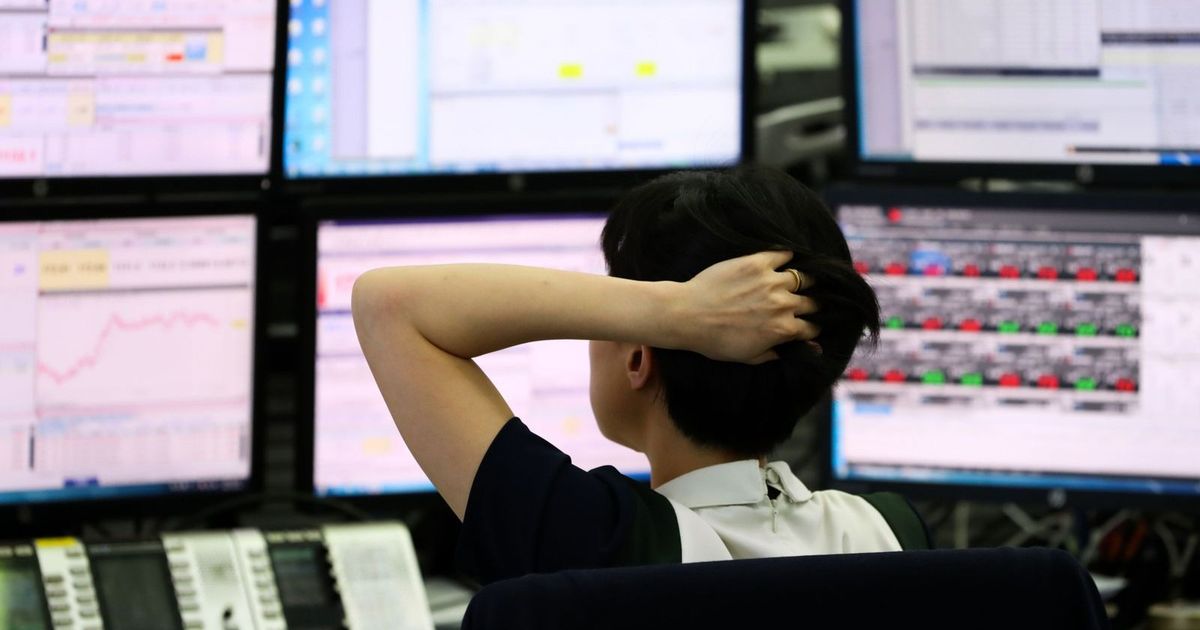The rally in global stocks extended with Asian shares trading above record closing levels, supported by easing trade tensions and growing optimism about interest rate cuts. MSCI’s regional stock index surpassed its all-time close, while indices in Japan and South Korea hit new record highs. The global all-country index also neared a new record high, while US index futures in Asian trade indicated additional gains after a strong rise on Monday. Japanese stocks rose amid expectations that Sanae Takaishi, a supporter of stimulus policies, will become Japan’s next prime minister. Rare metals and gold continue to rise. Shares of rare metals companies jumped after the signing of an agreement between the United States and Australia, while gold stabilized near its highest record levels. U.S. 10-year Treasury bond yields fell below 4% as oil prices fell, easing inflation concerns ahead of the release of consumer price data on Friday. Brent crude settled near $60 a barrel, heading for its lowest close since May, while the Swiss franc neared its highest levels against the euro since 2015. The results of US companies support the upward wave. Asian markets are benefiting from new momentum after the S&P 500 index posted its biggest two-day gain since June on Monday, with gains of about 85% of companies beating expectations so far. Strong earnings continue to fuel the rally fueled by tech stocks, at a time when investors are betting the Federal Reserve will cut interest rates later this month as trade tensions between the United States and China ease. “There is enough for investors to feel comfortable about in an environment of low interest rates and structural growth in demand for AI,” said Fei-Cern Ling, managing director at Union Bancaire Privée. He added: “Unless we see a sharp slowdown in the US economy, a new round of US-China tensions, or conclusive evidence that artificial intelligence is just a bubble, markets could remain supported until the end of the year.” The decline in trade fears boosts confidence. Although trade tensions continue to fuel investor sentiment and increase volatility, periods of decline in the market remain short as individual investors see these declines as opportunities to increase the risks in their portfolios. Global stocks have rallied to new highs since falling in April, with traders betting that billions of dollars spent by companies on artificial intelligence will turn into future profits. This optimism faces a new test with the release of corporate results, as Netflix and Tesla are scheduled to announce their results this week. The positive mood is also fueled by progress in trade talks between the United States and China. Although US President Donald Trump renewed his threat to raise tariffs on Chinese goods “if a deal is not reached” by November 1, he confirmed his intention to meet Chinese President Xi Jinping next week. Markets were jittery earlier this month after Trump raised the possibility of very high tariffs and accused China of imposing “hostile export restrictions.” Soybean futures jumped on Monday as farmers hoped Trump would reach a deal with China that would restore stalled U.S. exports. Korean exports rise thanks to demand for chips. South Korea’s primary exports rose in October thanks to strong demand for semiconductors, despite the impact of US tariffs and holidays on the growth rate. The KOSPI index rose by 1.2%. “A strong start to the week on Wall Street helped lift Asian markets today,” said Nick Tweedale, senior analyst at AT Global Markets in Sydney. He added: “The easing of trade concerns has contributed to the improvement in general sentiment, as investors are currently looking at the market with clear optimism.” Watch for US inflation data After being delayed by the government shutdown, the US Bureau of Labor Statistics is scheduled to release consumer price index data for September on Friday, after it was supposed to be published on October 15. These data will provide the Federal Reserve with a basic reading on inflation ahead of its meeting on October 30. Rick Gardner of RGA Investments said the data will be more important because of government cuts. adds that he still expects a rate cut in October. He pointed out that a key test for the markets will be the results of major technology companies, as investors try to understand the extent to which spending on artificial intelligence is turning into tangible gains. He added: “We’re seeing normal seasonal swings in October, but recent moves have been relatively limited by historical standards, and it appears that the buy-the-dip mentality is still prevalent.” Takaishi prepares to become Japan’s first female prime minister In Japan, Sanae Takaishi is preparing to become the country’s first female prime minister, facing challenges that include calming popular discontent with the high cost of living, dealing with the Trump administration and reviving the fortunes of the ruling party that has lost its electoral dominance in recent years.
Asian shares are surpassing their highest levels, supported by a wave of optimism that has spread through the markets
